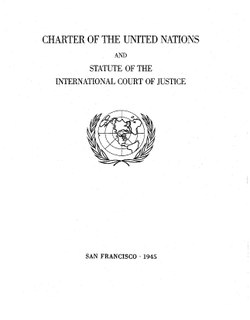
Human rights are moral principles or norms that describe certain standards of human behaviour and are regularly protected in municipal and international law. They are commonly understood as inalienable, fundamental rights "to which a person is inherently entitled simply because she or he is a human being" and which are "inherent in all human beings", regardless of their age, ethnic origin, location, language, religion, ethnicity, or any other status. They are applicable everywhere and at every time in the sense of being universal, and they are egalitarian in the sense of being the same for everyone. They are regarded as requiring empathy and the rule of law and imposing an obligation on persons to respect the human rights of others, and it is generally considered that they should not be taken away except as a result of due process based on specific circumstances.

The Office of the United Nations High Commissioner for Human Rights, commonly known as the Office of the High Commissioner for Human Rights (OHCHR) or the UN Human Rights Office, is a department of the Secretariat of the United Nations that works to promote and protect the human rights that are guaranteed under international law and stipulated in the Universal Declaration of Human Rights of 1948. The office was established by the UN General Assembly on 20 December 1993 in the wake of the 1993 World Conference on Human Rights.

Crimes against humanity are certain acts that are purposely committed as part of a widespread or systematic attack, directed against any civilians, in time of war or peace. The first prosecution for crimes against humanity took place at the Nuremberg trials. Initially being considered for legal use, widely in International Law, following the Armenian Genocide.

The Charter of the United Nations is the foundational treaty of the United Nations, an intergovernmental organization. It establishes the purposes, governing structure, and overall framework of the UN system, including its six principal organs: the Secretariat, the General Assembly, the Security Council, the Economic and Social Council, the International Court of Justice, and the Trusteeship Council.

The International Covenant on Civil and Political Rights (ICCPR) is a multilateral treaty adopted by United Nations General Assembly Resolution 2200A (XXI) on 16 December 1966, and in force from 23 March 1976 in accordance with Article 49 of the covenant. Article 49 allowed that the covenant would enter into force three months after the date of the deposit of the thirty-fifth instrument of ratification or accession. The covenant commits its parties to respect the civil and political rights of individuals, including the right to life, freedom of religion, freedom of speech, freedom of assembly, electoral rights and rights to due process and a fair trial. As of September 2019, the Covenant has 173 parties and six more signatories without ratification.

The law of war is the component of international law that regulates the conditions for war and the conduct of warring parties. Laws of war define sovereignty and nationhood, states and territories, occupation, and other critical terms of international law.
International human rights law (IHRL) is the body of international law designed to promote human rights on social, regional, and domestic levels. As a form of international law, international human rights law are primarily made up of treaties, agreements between sovereign states intended to have binding legal effect between the parties that have agreed to them; and customary international law. Other international human rights instruments, while not legally binding, contribute to the implementation, understanding and development of international human rights law and have been recognized as a source of political obligation.
Extradition is an act where one jurisdiction delivers a person accused or convicted of committing a crime in another jurisdiction, over to their law enforcement. It is a cooperative law enforcement process between the two jurisdictions and depends on the arrangements made between them. Besides the legal aspects of the process, extradition also involves the physical transfer of custody of the person being extradited to the legal authority of the requesting jurisdiction.

The American Convention on Human Rights, also known as the Pact of San José, is an international human rights instrument. It was adopted by many countries in the Western Hemisphere in San José, Costa Rica, on 22 November 1969. It came into force after the eleventh instrument of ratification was deposited on 18 July 1978.
A peremptory norm is a fundamental principle of international law that is accepted by the international community of states as a norm from which no derogation is permitted.

The School of Salamanca is the Renaissance of thought in diverse intellectual areas by Spanish theologians, rooted in the intellectual and pedagogical work of Francisco de Vitoria. From the beginning of the 16th century the traditional Catholic conception of man and of his relation to God and to the world had been assaulted by the rise of humanism, by the Protestant Reformation and by the new geographical discoveries and their consequences. These new problems were addressed by the School of Salamanca. The name refers to the University of Salamanca, where de Vitoria and other members of the school were based.
Customary international law is an aspect of international law involving the principle of custom. Along with general principles of law and treaties, custom is considered by the International Court of Justice, jurists, the United Nations, and its member states to be among the primary sources of international law.
The ius gentium or jus gentium is a concept of international law within the ancient Roman legal system and Western law traditions based on or influenced by it. The ius gentium is not a body of statute law or a legal code, but rather customary law thought to be held in common by all gentes in "reasoned compliance with standards of international conduct".
International law also known as "law of nations" is the name of a body of rules which regulate the conduct of sovereign states in their relations with one another. Sources of international law include treaties, international customs, general widely recognized principles of law, the decisions of national and lower courts, and scholarly writings. They are the materials and processes out of which the rules and principles regulating the international community are developed. They have been influenced by a range of political and legal theories.
The history of international law examines the evolution and development of public international law in both state practice and conceptual understanding. Modern international law developed out of Renaissance Europe and is strongly entwined with the development of western political organisation at that time. The development of European notions of sovereignty and nation states would necessitate the development of methods for interstate relations and standards of behaviour, and these would lay the foundations of what would become international law. However, while the origins of the modern system of international law can be traced back 400 years, the development of the concepts and practises that would underpin that system can be traced back to ancient historical politics and relationships thousands of years old. Important concepts are derived from the practice between Greek city-states and the Roman law concept of ius gentium. These principles were not universal however. In East Asia, political theory was based not on the equality of states, but rather the cosmological supremacy of the Emperor of China.
International law, also known as public international law and law of nations, is the set of rules, norms, and standards generally accepted in relations between nations. It establishes normative guidelines and a common conceptual framework to guide states across a broad range of domains, including war, diplomacy, trade, and human rights. International law aims at the practice of stable, consistent, and organized international relations.

The discovery doctrine, also called doctrine of discovery, is a concept of public international law expounded by the United States Supreme Court in a series of decisions, most notably Johnson v. M'Intosh in 1823. Chief Justice John Marshall explained and applied the way that colonial powers laid claim to lands belonging to foreign sovereign nations during the Age of Discovery. Under it, title to lands lay with the government whose subjects travelled to and occupied a territory whose inhabitants were not subjects of a European Christian monarch. The doctrine has been primarily used to support decisions invalidating or ignoring aboriginal possession of land in favor of modern colonial/imperial governments, such as in the 2005 case of Sherrill v. Oneida Nation.

Ius or Jus in ancient Rome was a right to which a citizen (civis) was entitled by virtue of his citizenship (civitas). The iura were specified by laws, so ius sometimes meant law. As one went to the law courts to sue for one's rights, ius also meant justice and the place where justice was sought.

Indigenous rights are those rights that exist in recognition of the specific condition of the indigenous peoples. This includes not only the most basic human rights of physical survival and integrity, but also the rights over their land, language, religion, and other elements of cultural heritage that are a part of their existence and identity as a people. This can be used as an expression for advocacy of social organizations, or form a part of the national law in establishing the relation between a government and the right of self-determination among its indigenous people, or in international law as a protection against violation of indigenous rights by actions of governments or groups of private interests.
International legal theory comprises a variety of theoretical and methodological approaches used to explain and analyse the content, formation and effectiveness of public international law and institutions and to suggest improvements. Some approaches center on the question of compliance: why states follow international norms in the absence of a coercive power that ensures compliance. Other approaches focus on the problem of the formation of international rules: why states voluntarily adopt international legal norms, that limit their freedom of action, in the absence of a world legislature. Other perspectives are policy oriented; they elaborate theoretical frameworks and instruments to criticize the existing rules and make suggestions on how to improve them. Some of these approaches are based on domestic legal theory, others are interdisciplinary, while others have been developed expressly to analyse international law.